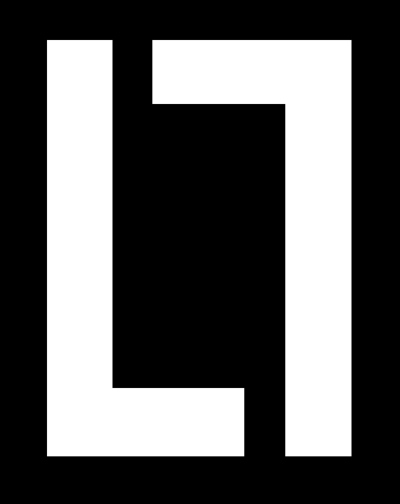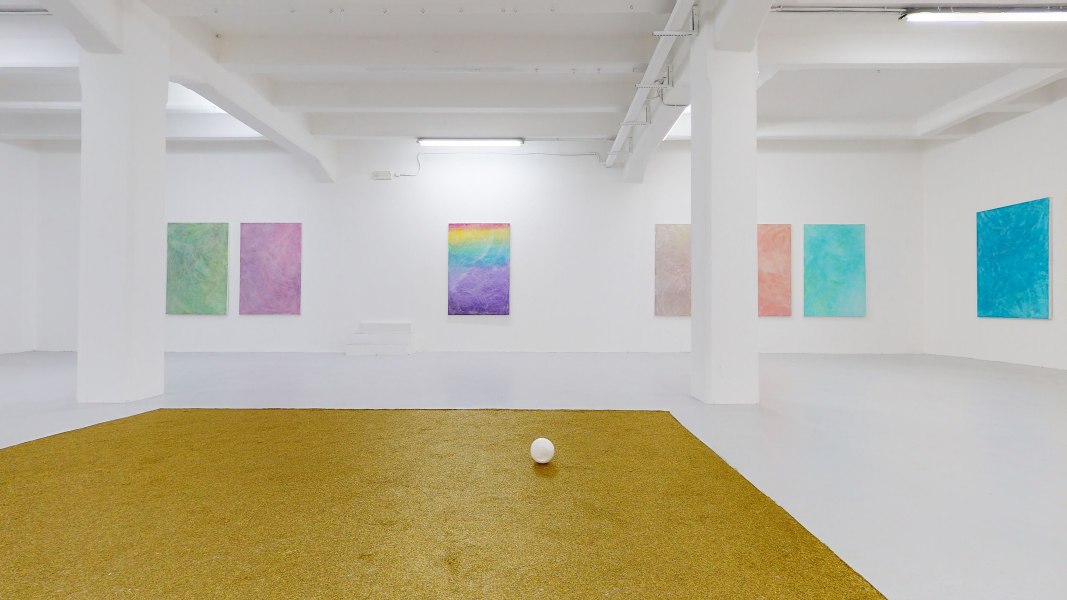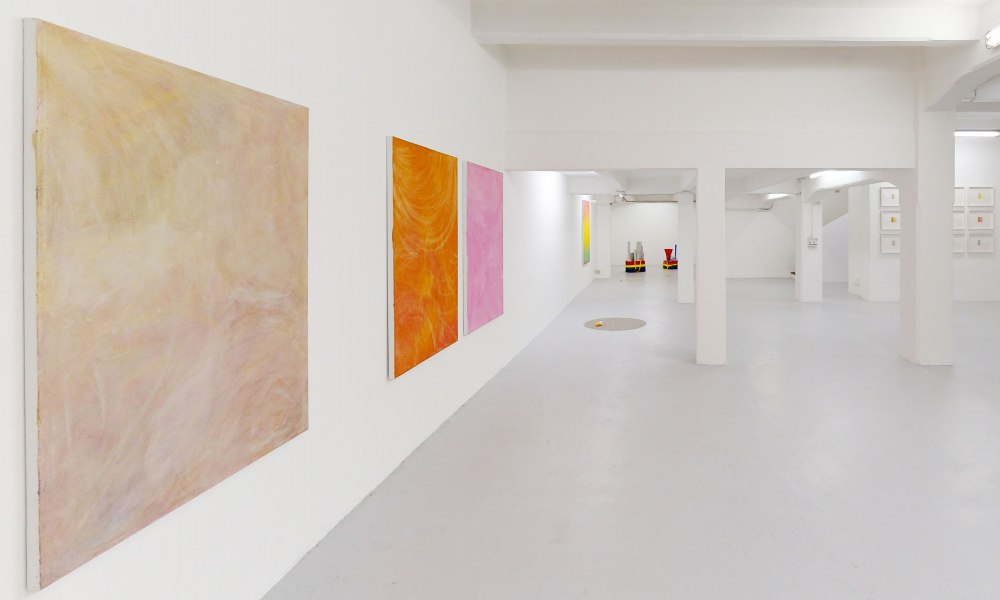DULCE DE LECHE MUY AMARGO
Inaugura
Presso
Partecipa
Fino a
DULCE DE LECHE MUY AMARGO
Comunicato
Stefan Milosavljevic DULCE DE LECHE MUY AMARGO
Il titolo della mostra si riferisce ad un paradosso, una possibilità, uno stato dell’esistenza improbabile ma non impossibile.
Il dulce de leche in spagnolo (o doce de leite in portoghese) è un dessert a base di latte originario dell'Argentina, così dolce da diventare talvolta amaro.
Già dal primo sguardo la personale di Stefan Milosavljevic (1992, Serbia) “Dulce de leche muy amargo” ci attira in una giostra di colori.
Venti tele, apparentemente minimali, abbracciano la galleria emanando onde cromatiche: i loro titoli svelano le parole chiave dell’intera esposizione come corpo, cosmo, sessualità, soglia, abbandono.
L’artista ha infatti giocato come un bambino con le tempere. A queste ha però addizionato sostanze chimiche legate al mondo ricreativo del sesso -narcotici ed eccitanti- sostanze il cui mix potrebbe essere fatale. E come un bambino che esplora i limiti, prima crea e poi distrugge: violentemente innesca un corpo a corpo con la tela che vuole slavare e ripulire, per rimuoverne l’immagine precedentemente impressa.
In egual modo nella serie “Interrupted Rainbow”, un pennello imbevuto di testosterone, sostanza responsabile di atteggiamenti aggressivi e di sopraffazione, modifica e scolora dodici arcobaleni -simboli di pace e socialità- semplicemente disegnati con marker su carta.
A terra, nelle due grandi installazioni che occupano la superficie della galleria, l’artista evidenzia ancora la contrapposizione tra le forze di distruzione e creazione attraverso sfere di minerali naturali che sovrastano brillanti polveri metalliche, frutto della disintegrazione di oggetti decorativi e utensili vari.
Il simbolico permea la mostra e l’elemento Arcobaleno della bandiera LGBTQI+, infine, ritorna evidente nelle due sculture dicotomiche “Sweet Summer Sweat” e “Heart of Glass” che giustappongono due sacchetti-contenitori a materiali difficilmente trasportabili, quali pesanti lastre di marmo e fragili vasi di vetro.
Stefan Milosavljevic, appassionato ricercatore del limite tra visibile ed invisibile, utilizza oggetti comuni decontestualizzati per dare immagine alle proprie esperienze, muovendosi in completa libertà tra pittura, disegni ed installazioni.
Stefan Milosavljevic - Dulce de leche muy amargo
The title of the exhibition refers to a paradox, a possibility, an unlikely but not impossible state of existence.
Dulce de leche in Spanish (or doce de leite in Portuguese) is a milk-based dessert originating from Argentina, so sweet that sometimes it becomes bitter.
From the very first glance, Stefan Milosavljevic's solo show (1992, Serbia) “Dulce de leche muy amargo” draws us into a carousel of colors.
Twenty apparently minimal canvases are aligned along the gallery walls, emanating chromatic waves: their titles reveal the key words of the exhibition as a whole, including body, cosmos, sexuality, threshold and abandonment.
In fact, here, just like a child, the artist played with tempera paints. To them, however, he has added chemical substances related to the recreational world of sex, namely narcotics and stimulants whose mix could be fatal. And then just like a child exploring his limits, he first creates and then destroys: violently triggering a melee with the canvas that he wants to wash and clean up, to remove the previously imprinted image.
Likewise in the “Interrupted Rainbow” series, a brush soaked in testosterone, a substance responsible for aggressive attitudes and oppression, modifies and discolors twelve rainbows - a symbol of peace and sociability - simply drawn with markers on paper.
On the floor, in the two large installations that occupy the ground surface of the gallery, the artist highlights the contrast between the forces of destruction and creation once again, using spheres of natural minerals that dominate brilliant metal powders, which are the result of the disintegration of decorative objects and ordinary tools.
The symbolic permeates the exhibition, and in the Rainbow element of the LGBTQI + flag, this is particularly evident in the two dichotomous sculptures "Sweet Summer Sweat" and "Heart of Glass", which juxtapose two bag-containers with materials that are difficult to transport, such as heavy marble slabs and fragile glass jars.
Stefan Milosavljevic, a passionate explorer of the limits between the visible and invisible, uses common, decontextualised objects to give an image to his experiences, moving in complete freedom between painting, drawings and installations.
Stefan Milosavljevic was born in Smederevo, Serbia, in 1992. He graduated from the Academy of Fine Arts in Venice in 2016 and subsequently attended the IUAV University, also in Venice.
Among his most recent exhibitions: Combat Prize, Finalists exhibition curated by BlobArt, Giovanni Fattori Museum, Livorno IT (2020), Life on Tralfamadore, The Flat - Massimo Carasi, Milan, IT (2020), Non-Gasoline stations De Pietri Artphilein Foundation , Lugano CH (2020), Ah, (exhibition only) Galleria Daniele Agostini, Lugano CH (2020); Ash, Daniele Agostini Gallery, Lugano (2019); Appocundria, Casa Testori, Novate Milanese (2019); I lied in a Visa Center, Galleria Più, Bologna (2018); Between light and darkness, Galleria San Fedele, Milan (2018); Hero of the world - solo exhibition, Nam Project, Milan (2017); WANNA FIGHT ?, Museum of Contemporary Art, Lissone (2017); A house, halfway, Sandretto Re Rebaudengo Foundation, Turin (2017); 100th Young Artists Collective, Bevilacqua La Masa Foundation, Venice (2016).
Winner of the Frase Contemporary Art Prize (2016) and MAC Under 30 Award: with a solo show at the project room of the Museum of Contemporary Art in Lissone as part of the Arteam Cup (2016). He also won the San Fedele Special Prize, Milan (2017); and was a finalist and winner of the design section of the COMBAT Prize (2020)
His works are present in private Swiss and Italian collections as well as in the Carmelo Graci Collection, Frase Contemporary Art Collection and De Pietri-Artphilein Foundation, Collection.
Come arrivare
- letto 481 volte






